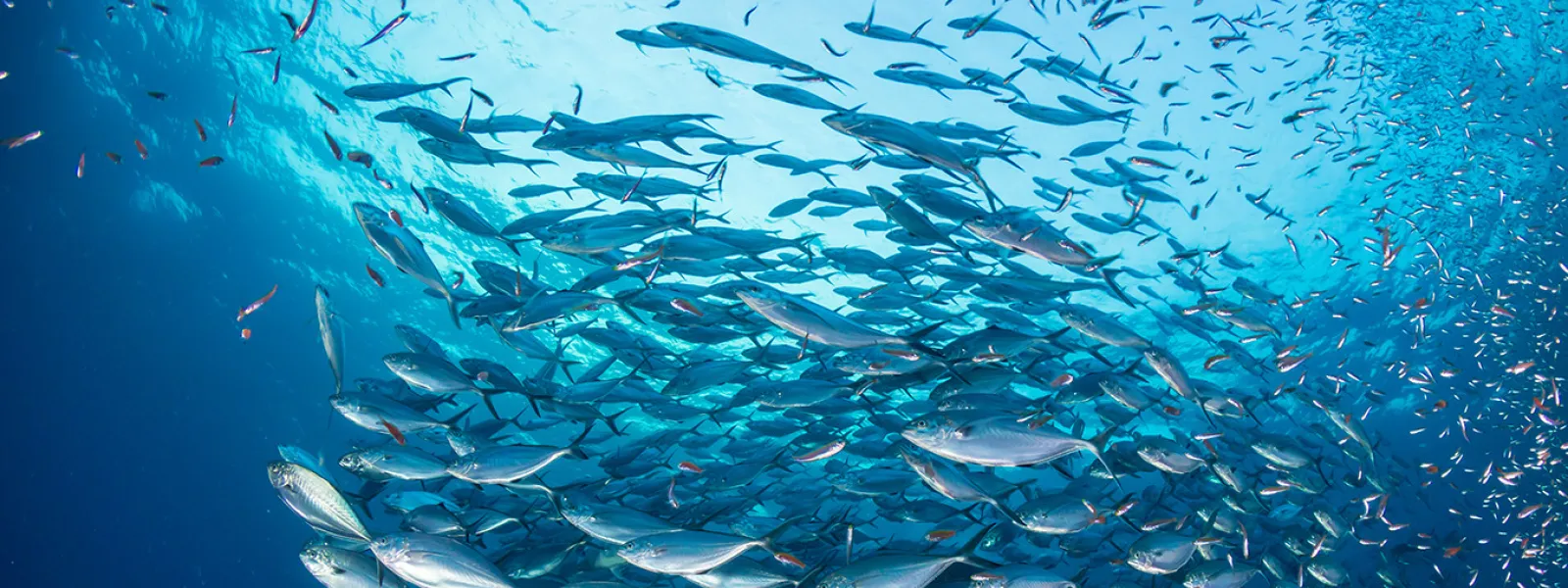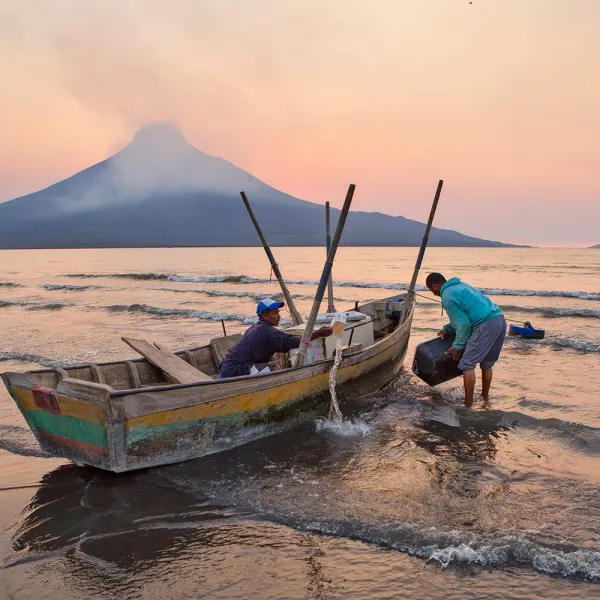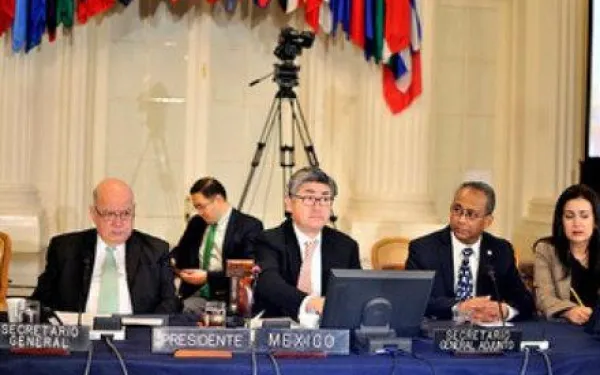
Project
ShutterstockTowards an end to subsidies that promote overfishing
Overfishing is one of the main problems for the health of our ocean. And the provision of negative subsidies to the fishing sector is one of the fundamental causes of overfishing.
Fishing subsidies are financial contributions, direct or indirect, that public entities grant to the industry.
Depending on their impacts, they can be beneficial when they promote the growth of fish stocks through conservation and fishery resource management tools. And they are considered negative or detrimental when they promote overfishing with support for, for example, increasing the catch capacity of a fishing fleet.
It is estimated that every year, governments spend approximately 22 billion dollars in negative subsidies to compensate costs for fuel, fishing gear and vessel improvements, among others.
Recent data show that, as a result of this support, 63% of fish stocks worldwide must be rebuilt and 34% are fished at "biologically unsustainable" levels.
Although negotiations on fisheries subsidies, within the framework of the World Trade Organization, officially began in 2001, it was not until the 2017 WTO Ministerial Conference that countries committed to taking action to reach an agreement.
This finally happened in June 2022, when member countries of the World Trade Organization reached, after more than two decades, a binding agreement to curb some harmful fisheries subsidies. It represents a fundamental step toward achieving the effective management of our fisheries resources, as well as toward ensuring global food security and the livelihoods of coastal communities.
The agreement reached at the 12th WTO Ministerial Conference provides for the creation of a global framework to reduce subsidies for illegal, unreported and unregulated fishing; subsidies for fishing overexploited stocks; and subsidies for vessels fishing on the unregulated high seas. It also includes measures aimed at greater transparency and accountability in the way governments support their fisheries sector.
The countries agreed to continue negotiating rules to curb other harmful subsidies, such as those that promote fishing in other countries' waters, overfishing and the overcapacity of a fleet to catch more fish than is sustainable.
If we want to have abundant and healthy fishery resources, it is time to change the way we have conceived fishing until now. We must focus our efforts on creating models of fishery use that allow for long-term conservation.
Partners:

Groups seek investigation into Mexico’s approval of four “mega resorts”
FOR IMMEDIATE RELEASE April 11, 2013 Media contacts: Mexico Sandra Moguel, [email protected], +52 (164) 621-02353 USA Sarah Burt, [email protected], +1 (415) 217-2055 Serena Ingre, [email protected], +1 (415) 875-6155 Groups seek investigation into Mexico’s approval of four “mega resorts” Massive tourism developments threaten fragile ecosystems and endangered species San Francisco, USA/La Paz, Mexico. In a petition submitted to the Commission for Environmental Cooperation, eleven conservation groups charged the Mexican government with failing to enforce its own environmental laws in authorizing the construction of four “mega resorts” in the Gulf of California. The Commission is an international body established under the North American Free Trade Agreement to promote cooperation among Canada, Mexico and the U.S. on environmental issues of continental concern. “The Mexican authorities’ approval of massive tourism projects in violation of environmental laws is unacceptable and demonstrates little regard for threatened species, the environment and local communities”, said Sandra Moguel of the Inter-American Association for Environmental Defense, and one of the signers of the petition. “We urge the new Administration and Minister Guerra Abud to ensure that the approval process of development projects is transparent and not arbitrary”. The approval of projects such as Cabo Cortés, Paraíso del Mar, Entre Mares, and Playa Espíritu threatens the unique coral reefs and mangrove ecosystems of the region, and endangered species such as humpback and gray whales, whale sharks, manta rays, sea turtles, sea lions, jaguars, crocodiles and many species of migratory birds. The petition highlights the four projects as examples of the Mexican Ministry of Environment and Natural Resources’ repeated failure to enforce environmental laws when approving large-scale tourist development projects in the Gulf of California. In particular, the government ignores laws requiring effective environmental impact assessment, protection of endangered species, and conservation of coastal ecosystems. The petitioners are requesting that the Commission investigate and develop a factual record to examine Mexico’s lack of enforcement of its environmental laws when authorizing these developments. Such a finding would pressure Mexico to comply with its own environmental safeguards. “These natural treasures are of importance to Mexican communities that depend on them as cultural, economic and recreational resources”, says Judith Castro with the Friends for the Conservation of Cabo Pulmo. “Mexico cannot continue to approve mega projects that displace residents, bulldoze wildlife habitat, and pollute the waters of this vital ecosystem”. Known as the “World’s Aquarium”, the Gulf of California is considered one of the most diverse marine regions on the planet, and is home to thousands of species. Specifically, these mega projects, two of which are already under construction, threatened the following critical areas in the region: Cabo Pulmo National Park: One of the healthiest coral reef systems in the world, a UNESCO World Heritage Site and a Ramsar Wetland of International Importance, Cabo Pulmo is threatened by massive developments like Cabo Cortés. The Cabo Cortés proposal included the equivalent of nearly 30,000 guest rooms in its hotels, condominiums and villas, two 27-hole golf courses, a 490 berth marina, and a system of canals and artificial lakes. Additionally, because the region has a desert climate without sufficient water to accommodate such amenities and the expected population growth, the proposal included a desalination plant that could have discharged hypersaline brine into the reef. While the project was ultimately rejected in June 2012, Cabo Pulmo is threatened by similar developments still being considered. The Marismas Nacionales Wetlands: Playa Espíritu, a project already under construction that includes three golf courses, two marinas, a wastewater plant, and additional infrastructure spread across more than 35,000 acres, threatens the Marismas Nacionales, the most extensive and well-preserved mangrove forest habitat on the western coast of Mexico, and home to more than 280 species of migratory and resident bird species. The Bay of La Paz: One of the most productive water bodies in the Gulf of California and an important area for nesting birds, the Bay of La Paz is jeopardized by two adjacent projects, Paraíso del Mar, currently under construction, and Entre Mares, proposed for construction on a sandbar extending into the bay. Combined, these two projects will develop nearly ten thousand hotel rooms, plus 4,000 homes, two golf courses and a large marina and would bring an additional population of more than 10,000 people in high season. Earthjustice and the Interamerican Association for Environmental Defense (AIDA) are filing the petition on behalf of the Ecological Network for Escuinapa Development (REDES), Friends for the Conservation of Cabo Pulmo (ACCP), WiLDCOAST, SUMAR, Los Cabos Coastkeepers, Alliance for the Sustainability of the Mexican Coastal Northwest (ALCOSTA), the Natural Resources Defense Council (NRDC), Greenpeace México and AIDA. The petitioners are calling on Mexico to protect the marine and coastal ecosystems of the Gulf of California, particularly coral reefs like the ones in Cabo Pulmo. “By approving these projects, Mexico is failing its obligations to protect wetlands, coral reefs and species of environmental and international importance”, said Carolina Herrera, Latin America Advocate with the Natural Resources Defense Council. “What this region in the Gulf of California needs is low-impact sustainable development where the well-being of local communities and the environment is the first priority”. A map of the projects, photos, videos, and background information are available at: http://earthjustice.org/cortes Read the petition here: http://earthjustice.org/documents/legal-document/pdf/petition-to-commission-english
Read more
What’s the latest on the reform of the Inter-American System of Human Rights?
By Astrid Puentes Riaño, co-director, AIDA,@astridpuentes In June, I wrote about how some OAS member states had begun a process to introduce tough reforms on the Inter-American Commission on Human Rights (IACHR) and the Inter-American Human Rights System that would weaken their ability to operate and protect our human rights. I want to bring you up to date on how the discussions are faring. More importantly, though, I want to ask you to get involved by signing thepetitionto ask the member states to strengthen –not weaken– the Inter-American System. More than 3,000 people have already signed! You can sign too! Watch our video message to the Permanent Council of the OAS (Spanish only) The outlook last June was pretty thorny. Seldom has an OAS General Assembly been as tense as the last two, particularly the most recent one when the Inter-American System came under fierce attack and several member states even sought to re-establish it. The Assembly ended with a call to reform the statute at an Extraordinary Assembly, something that’s never happened in the history of the IACHR. The good news is that the member states appear to have somewhat cooled their clamoring. There are more signs of a willingness to talk. The Representative of Brazil made reference to this change during the Permanent Council’s extraordinary session with civil society representatives, saying the confidence and opportunities for negotiations have improved. He said this process should lead to an outcome in which the underlying question of human rights takes precedence over procedural matters. Watch our video message to the Permanent Council of the OAS (Spanish only) It’s an honor that the representative quoted us. Now we have to see if this good message gets translated into action by, for example, addressing the IACHR’s requests on Brazil including those regarding the contentious Belo Monte dam. The Brazilian government must respond and give its perspective on the case. The not so good news is that the process is not yet complete. We’re still waiting for a definition on what the reforms will be and how they will be implemented. For example, part of the reform package proposed by some states is that if the Inter-American Court rejects a request for precautionary measures then the IACHR has to do so too. That, as we have said, fails to recognize the natural differences of the Court and the IACHR and puts them at risk. The IACHR has committed to producing various reports, which will eat up a lot of its resources and thus could affect its duty to protect, its duty to proceed with cases of human rights violations affecting millions of people in the hemisphere. It is understood that neither the Inter-American System nor any of those involved are perfect. There is still a lot to improve. But it is essential that this process concludes with recommendations to make the System more effective. That means that AIDA and our colleagues in the hemisphere will continue to lobby the member states, the OAS and the IACHR itself. We will continue to offer our opinions. We will continue to share our experiences as users of the System. We will continue to fight to prevent any weakening of the System. That is why we ask you to sign TODAY and help us defend the IASHR and, in the process, our human rights. If you as an inpidual or community member believe that you could use one of the IACHR’s decisions in cases involving dams, mining projects, tourism developments, free speech, the protection of women or anything else, then speak out and sign up now! If not you, if not us, then who? Full video of the session In this recording you can hear the Representative of Brazil cite AIDA (last 5 minutes)
Read moreThe declaration of Santurbán as a Regional Natural Park is a start toward complying with the prohibition on mining in páramos
FOR IMMEDIATE RELEASE February 7, 2013 Media contacts: Astrid Puentes Riaño, AIDA Co-Director, [email protected], +52-55 5212-0141 Paulo Bacca, AIDA Legal Advisor, [email protected], +57-1 232-4246 The declaration of Santurbán as a Regional Natural Park is a start toward complying with the prohibition on mining in páramos AIDA supports the decision and urges the Ministry of Environment to guarantee the protection of all páramo ecosystems. Bogotá, Colombia. The Interamerican Association for Environmental Defense (AIDA) welcomed the declaration of a portion of the Santurbán páramo in the Colombian departments of Santander and Norte de Santander as a Regional Natural Park. The measure, taken in January, reaffirms the prohibition on mining activities in Colombia’s páramo ecosystems, a move that helps improve the protection of these sensitive wetlands and critical carbon sinks. AIDA expressed its support for the creation of the park in a letter to the Ministry of Environment and Sustainable Development, the Alexander Von Humboldt Institute and the Autonomous Regional Corporation for the Defense of the Bucaramanga Plateau (CDMB) of Colombia, confirming that this act is congruent with the prohibition on mining in the region. It also reminded the government that this does not mean mining can be permitted in other parts of the páramo. The park declaration encompasses 11,700 of the 92,000 hectares of the páramo, and was proposed to the CDMB board of directors by Environment Minister Juan Gabriel Uribe based on a technical report issued by the Von Humboldt Institute. “At AIDA, we have spent more than five years highlighting the national and international obligation of the state to protect páramos. Although creation of the park is a good first step, we insist that the government comply with the law and ensure mining will be prohibited in the entire ecosystem”, said Paulo Bacca, a lawyer at the NGO. AIDA has worked to create and enforce the prohibition on mining in páramos, providing feedback on the Mining Code and related bills, and by following paradigmatic cases like Santurbán. It is a positive step that the Ministry of Environment, in accordance with constitutional and international commitments, has denied the environmental license requested by the Canadian company Greystar Resources Ltd. (now Eco Oro Minerals Corp.) to develop the Angostura gold mine in the heart of the páramo. “This issue goes beyond the legal arena. It is a matter of national security and the quality of life for Colombians given that the páramos are essential for the supply of 70% of drinking water, biodiversity conservation, climate change mitigation and even power generation”, said Astrid Puentes Riaño, co-executive director of AIDA. To prevent the lack of territorial demarcation from being used as justification for allowing mining projects in páramo areas, AIDA urges the Ministry of Environment to immediately make use of the new mapping of páramos provided to it by the Von Humboldt Institute a few months ago. The use of that mapping can help prevent mining companies from hiding behind the lack of a definition and demarcation of critical ecosystems like páramos to advance mining projects in areas where such activities clearly should not be permitted, thus furthering ecosystem and water resource protection critical to Colombian citizens. See the PDF version of the letter (Spanish only). For more information about the Angostura case and Santurbán páramo, please see: http://www.aida-americas.org/en/protecting_the_santurban_paramo_from_angostura_project
Read more